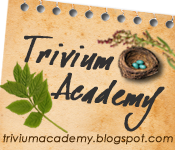I want my children to study the progymnasmata and later rhetoric, the path is not clear as to what to effectively use and when. Here's the list of the programs I'm contemplating and what the problem is:
Writing Tales: If we were to start in 3rd grade, I feel this would best fit my child and create an easy transition into writing without bumping into too many misunderstandings due to terms and the way the program is structured. My only concern is how much of the progymnasmata is covered and whether it would be easy to transition to another program like Classical Composition or Classical Writing if we needed to.
Classical Writing: If this were finished I would feel more comfortable using it, I'm concerned with the timetable of this program, at their website they have
3-4th grade Aesop (Fable)
5-6th grade Homer (Narrative)
7-8th grade Diogenes: Maxim
8-9th grade Diogenes: Chreia
But what about the Refutation, Confirmation, Commonplace, Encomium (praise and blame), Comparison, Speech-in-character, Description, Thesis and Proposal of a Law stages of the progymnasmata?
Their website does have these levels (to come)
Level 4: Classical Writing - Herodotus which is basic argumentation for or against an issue (10th grade?)
Level 5: Classical Writing - Plutarch Description, praise, blame, and commonplace (11th grade?)
Level 6: Classical Writing - Demosthenes, thesis, research, and law. (12th grade?)
Classical Composition- Jim Selby is a teacher at Whitefield Academy who has devised a progymnasmata curriculum that he has used with his students. I feel the most comfortable using this but I feel the format of the lessons will be a learning curve for me.
4th grade- Fable
5th grade- Narrative
6th grade- Chreia/Maxim, may begin Refutation/Confirmation
7th grade- Refutation/Confirmation, Common Topic, may begin Encomium/Invective/Comparison
8th grade- Encomium/Invective/Comparison, may begin Characterization and Description
9th grade- Characterization and Description, Thesis/Law
Honestly I like this timetable better, I would love to focus 10-12 grades on practical use of what has been learned. Whether or not my children will be able to follow the timetable is a different matter altogether. I have Frank D'Angelo's Composition in the Classical Tradition so I have a reference to use at any time outside of a curriculum, as well as websites. This timetable also allows us to start rhetoric without attempting to do a writing program.
Rhetoric & Logic- the general thoughts: I don't know how timely this path will be until we get closer.
3rd-5th - (Dandy Lion) Puzzles and workbooks
6th- Informal logic possibly with Critical Thinking Books 1 & 2
7th grade- The Art of Argument (Classical Academic Press)
8th grade- Traditional Logic I & II
9th grade- Traditional Logic II or Material Logic I
10th - Classical Rhetoric with Aristotle
11th & 12- Classical Rhetoric with the Modern Student, The Rules of Argument?
I do feel writing, logic and rhetoric blend in certain ways- think, speak, write. I want the materials to mesh well with each other.
I don't feel comfortable making a decision about 3rd grade writing until I feel comfortable about where we'll go after 3rd grade. With Classical Writing, we would not cover the progymnasmata in its entirety, with Classical Composition, I can see that happening. I'm not sure what the best course of action is which make this decision difficult. This is where I find homeschooling difficult, trying to make decisions based on others' opinions and from an uneducated point of view but still do the best for your child without allowing your short-comings to get in the way.
AFTERTHOUGHTS
3rd grade: Writing Tales 1, while going through Classical Composition's Fable myself. Writing Tales has grammar in the program so I can skip a grammar program next year. I think Writing Tales will be a wonderful transition for us into a writing program. In 4th grade, we'll start Junior Analytical Grammar alongside Classical Composition (if that works out for me the way I think it will.) Subject to change, of course.






Sunday, September 30, 2007
Writing Woes: Where's the Path?
Labels:
homeschool resources,
language arts
Subscribe to:
Post Comments (Atom)






















5 comments:
I am having quite the same dilemma here. I have one spreadsheet with all of the possibilities in it. I prefer CW because of the inclusion of Harvey's and because the format of the books is simply easier to use, but I can't let my kids wait until 12th grade to have mastered writing, either, and if CW goes as it has so far, the program will extend into the college years. Right now my plan is to start with CW Aesop while we ease into learning writing, then switch when we have our bearings. There really aren't any excellent choices . . . yet.
Jessica, under "Classical Composition," what do you mean by this comment?
"This timetable also allows us to start rhetoric without attempting to do a writing program."
Dear Anonymous,
I mean that we will be done with the instructional portion of the progymnasmata (following the time table) before we start a study of Rhetoric instead of doing them together. The progymnasmata is intended to prepare a student for the study of rhetoric. Studying Rhetoric
Hope that clears things up!
:) Jessica
I see. Before I work on a longer response to your WTM plea, I'll post a short answer here. At the heart of your dilemma is a misunderstanding: taking a student through the progymnasmata IS studying rhetoric.
I'll explain more.
Tina,
I understand that by studying the progymnasmata it is studying rhetoric. The more I learn about this I wonder why SWB/JW didn't recommend or mention the progymnasmata in WTM, the other components are there.
I appreciate any insight you have to offer Tina. Thank you!
:) Jessica
Post a Comment